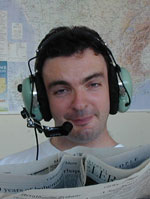Stanley A. Weiss International Herald TribuneWEDNESDAY, MARCH 15, 2006
LONDON To listen to many Western observers, Iran's hard-line president Mahmoud Ahmadinejad has reignited the Islamic Revolution and is catapulting the world toward nuclear confrontation. Elected last year in a "landslide," his triumph supposedly returns all power to a unified clique of clerical reactionaries, dealing a death blow to Iran's reform movement.
Emboldened by record oil revenues and divisions within the UN Security Council, which will address Iran's nuclear activities this week, Tehran brazenly resumes enriching uranium for a nuclear weapon. Ahmadinejad, deemed the new Hitler for calling the Holocaust a "myth," then has the means to fulfill his pledge to "wipe Israel off the map."
Perhaps no headline captured this hysteria more than a recent cover of Newsweek, from which Ahmadinejad peered menacingly at the world and which asked, alarmingly, "How Dangerous is Iran?"
The answer? Not as dangerous as many in the West believe.
An Iranian bomb is neither imminent nor would it be apocalyptic. According to the latest U.S. intelligence estimates, Tehran is a decade away from possessing a nuclear weapon. Moreover, the Cold War logic of containment and deterrence still applies to Iran's ayatollahs, who are survivors, not suicidal.
Washington, having denied itself diplomatic and business eyes and ears in Iran since the 1979 revolution, is driving blind - unable to see, but hypersensitive to the sound of saber-rattling in Tehran.
"Misunderstanding the other side's ultimate intentions isn't a unilateral problem," says Siamak Namazi, a Tehran-based political analyst. "Both sides tend to misread the other's hand." Indeed, recognizing the weak hand now being played by Ahmadinejad is a prerequisite for a more rational U.S. policy toward the Islamic Republic.
Myth: Ahmadinejad's "landslide" win reflects the aspirations of Iranians. In the first round of voting last spring, Ali Akbar Rafsanjani, the centrist former president, received more votes than Ahmadinejad. Faced with the lesser of two evils, most Iranians boycotted the runoff, allowing Ahmadinejad, who campaigned as an anti-corruption populist, to claim victory thanks to mere third of eligible voters. Some mandate.
Myth: All power now rests with a united clerical regime. The regime is rife with institutional divisions and personal rivalries. Under the Iranian constitution, absolute power still rests with the Supreme Leader, Ayatollah Ali Khamenei, who may fear a challenge to his authority from the radical Ayatollah Mohammed Taqi Mesbah-Yazdi, Ahmadinejad's spiritual mentor.
Khamenei and the clerical elite already seem, to be tightening the screws on the new president. Parliament rejected Ahmadinejad's first three nominees for oil minister, and Khamenei has given the Expediency Council, which is headed by Rafsanjani, new authority to supervise Ahmadinejad's administration.
Myth: Ahmadinejad's incendiary rhetoric is the rambling of a madman. The president's nuclear saber-rattling and Holocaust denials are, in fact, deliberate provocations. Lacking a popular mandate, he uses his nuclear posturing to align him with the vast majority of Iranians who insist they will never relinquish their "right' to a nuclear program. In fact, Ahmadinejad might welcome punitive action by the West. Economic sanctions would afford him a scapegoat for failing to make good on his wide-eyed campaign promises to redistribute wealth to the poor.
U.S. or Israeli air strikes against nuclear targets would unite Iran as never before and give Tehran another excuse to suppress domestic dissidents
Myth: Oil-rich Iran can go it alone. Despite Ahmadinejad's chest-thumping boasts of Iran's self-reliance, the world's fourth-largest oil exporter desperately needs foreign investment to modernize its dilapidated refineries and reduce crushing unemployment and inflation. Regionally, it needs Washington's help to counter the greatest threat to Shiite Iran - not a nuclear Israel, but a nuclear, Talibanized, Sunni Pakistan.
Faced with these realities, it's time for Washington to call Ahmadinejad's bluff by playing the card the hard-liners fear most: a dramatic U.S. offer of reconciliation, including a security guarantee like that offered North Korea. Such a move would expose the rifts in the regime, deny the hard-liners the confrontation they court, and deprive the bankrupt revolutionaries of their Great Satan.
Bold moves have never been a part of Washington's game plan toward Tehran. But a power play like rapprochement may be the best chance to deal a new deck that includes mutual respect rather than the same old cards of mutual confrontation.
Stanley A. Weiss is founder and chairman of Business Executives for National Security, a nonpartisan organization based in Washington. This is a personal comment.
mardi, mars 21, 2006
Inscription à :
Publier les commentaires (Atom)

Aucun commentaire:
Enregistrer un commentaire